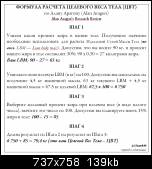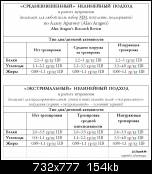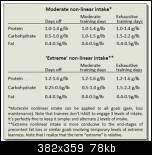7-10% оптимальны при правильном питании
Ты серьезно? Мне кажется для организма это режим голода, при первой возможности нарастить мясо/жир последнее предпочтительнее???


Про рекомпозицию от Алана Арагона.кстати Арагон в отличии от Лайла и bulking-cutting метод
пропогандирует нечто называемое "culking" - рекомпозиция

 оригинал
оригинал
 оригинал
оригинал
 оригинал
оригинал
Сообщение изменено: Znatok Ne (21 мая 2014 - 08:04)

Еще вопрос.
Оба атлета 15% жира имеют, в течении 3 месяцев питаются 60000 ккал и тратят 60000 ккал одинаковое БЖУ, тренировки у обоих с утра, в конце эксперимента вес не измениться.
Разница лишь первый 50% еды будет съедать сразу после трени (утром), второй не ест после трени и 50% еды перед сном.
Вопрос изменится ли % жира на выходе?


Настала моя очередь спроситьrihad, то есть, организм будет наращивать мышцы (и увеличивать расход энергии), несмотря на то, что НИКАКИХ запасов энергии у него нет, и можно запросто впасть в кому и умереть?
Вы, наверное, забыли про то, что организм всеми силами старается ВЫЖИТЬ.
Выживание это и есть жизнь.На чём основано это утверждение?

Оxотник, потенциально разницы не будет, практически возможны варианты из за возможных нюансов.
Тоесть ты предлагаешь не связавать тренировки и большую часть еды, тоесть утром оттренился а вечером нажрался. В лингейз предлагают большую часть ккал съедать именно после трени.
Заметь я не спрашиваю буду худеть/набирать т.к. на поддержке, спрашиваю именно ПРО % ЖИРА?

Есть мнение что чем больше жира, тем больше стремится запасать его и меньше мышц, и наоборот, чем меньше жира, тем больше мышц и меньше жира запасается.он всегда стремится именно к этому ...
http://www.bodyrecom...on-changes.htmlleaner individuals will tend to gain more LBM and less fat and fatter individuals will tend to gain more fat and less LBM

http://www.bodyrecom...on-numbers.html
Lower Isn’t Better
Before winding up this article, I really want to drive the point home: lower body fat is not better. Not from a performance standpoint and not from a health standpoint. Although it’s probably as related to energy balance as body fat per se, the point is that when folks get beyond a certain point of leanness, hormone levels are disrupted in both men and women (and a great deal of this is controlled by leptin, discussed in detail in other articles on the site).
The normal menstrual cycle in women may stop (this is called ammennorrhea), indicating a problem with estrogen production. This tends to cause bone loss which is a very serious problem.
In men not using drugs to maintain their hormone levels, testosterone can approach near-castrate levels as they reach the lower limits of body fat. Complaints of zero sex drive (and not being able to get it up even if the drive were there) are common among natural bodybuilders who get extremely lean.
And that’s just the tip of the iceberg. Thyroid, growth hormone, IGF-1, metabolic rate, and the immune system are all severely depressed under situations of extremely low body fat (genetic oddities excepted). Cortisol goes through the roof at extremely low body fat levels especially when a lot of training is being done.
This is all just part of a coordinated set of adaptations that occur with both starvation and dieting (dieting is just starvation on a smaller/slower scale) to try to keep you alive. It’s frustrating but actually makes perfect sense, at least to your body.
A body fat of 5% in a man is likely occurring because there is no food. Your body can’t tell the difference between you starving it because you’re a crazy bodybuilder or you starving because there’s no food available ; it reacts the same way.
If there is no food, the last thing your body wants is for you to get your mate pregnant. Either there isn’t enough food to keep it alive or you’ll be dead before it’s born, and unable to fulfill your fatherly duties (watching TV, drinking beer, changing the oil and killing the occasional spider). So testosterone crashes to make it impossible in the first place. If you’re starving, chances are so is your mate so that’s a double whammy.
A woman dieting to 12% or lower body fat wouldn’t be able to bring a baby to term safely in the first place, so the body prevents it by shutting down the menstrual cycle. I should note that the reasons for the shutdown are actually more complex and some dieting women will lose their period at higher body fat percentages. It’s actually more an issue of energy balance than body fat per se but that’s beyond the scope of this article.
Some women look upon the loss of their period as a benefit, just one less monthly messy (sorry) hassle. But the bone loss and estrogen issue is not a joke, and can (will) cause problems down the road. Studies of female gymnasts and ballerinas are finding low bone densities similar to post-menopausal women. Certainly not the picture of a healthy athlete. And if the bone doesn’t develop during puberty, it may never develop at all.
For those truly obsessed with body image, body fat percentages of ~8 for men and 14-15% for women should be safely sustainable year round although it will require nearly fanatical devotion to daily diet and training (or having picked the right parents to start with). As long as the person is at least eating at maintenance, hormones shouldn’t be too mucked up.
The same probably holds for athletes (most claims of insanely low body fat levels like 2-3% in athletes being gross over estimations). Without drugs, most athletes won’t perform well trying to compete at 5% body fat. They certainly won’t train effectively at that level, if for no other reason than the caloric restriction needed to get to that low of a body fat level will hurt training performance and adaptations.
As I noted above, bodybuilders usually don’t have a choice, they have to be walking anatomy charts when they step on stage. But with few exceptions, they don’t maintain that body fat level for any extended periods in the first place.

Тоесть ты предлагаешь не связавать тренировки и большую часть еды
Ты задался гипотетическим вопросом, я дал тебе гипотетический ответ.
Если вопрос будет стоять именно в таком ключе, то да стоит питание выстраивать относительно тренинга, насчёт большей части еды я так не считаю. Я считаю, что каждый приём пищи должен быть полноценным.

ну с этим то никто не спорит ...по крайней мере я точно ... но то что копить жир в нас заложено эволюционно и этому отдается преимущество ... с этим тоже спорить бесполезно ... да при малом проценте жира и регулярной и адекватной физнагрузки партиционирование калорий несколько изменяется ... но все же глобально это заложенные в нас механизмы не изменяет ...Есть мнение что чем больше жира, тем больше стремится запасать его и меньше мышц, и наоборот, чем меньше жира, тем больше мышц и меньше жира запасается.

Сообщение изменено: rihad (21 мая 2014 - 09:32)

d-rago-n, а чего, он же не мышечный особо. Или вы считаете что периодически меньше кушать для поддержки такого уровня трудно без лекарств?
Ну, мышцев у него есть.
Где-то читал, что она на таком проценте жира набирал.
ИМХО, это невозможно.
Да и поддерживать такой уровень ооочень сложно, если вообще возможно.

Когда бросают в разных статьях избитое клише: "для роста нужен профицит" так и хочется спросить, а как же ты, сцуко, рос в детстве, тоже калории считал чтобы не дай бог на поддержке не оказаться? А может организм сам лучше знает, как ему расти с той едой, которую ты ему даешь, и как растут 7 миллиардов людей по всему свету в самых разных уголках планеты и с самым разным достатком? Там блин не только мышцы, там еще и кости, кожа, органы растут. А здесь им видите ли 500 ккал профицита для роста нужно... Профицита доходов пищевой индустрии.
Ты не прав. Пару простейших пример из жизни :
1."военные" дети в нашей стране выросли меньше своих родителей. И это понятно, они жутко недоедали.
2.крутая акселерация в азиатских странах в 70-80-е годы. они наконец-таки стали есть досыта.
0 пользователей, 1 гостей, 0 скрытых